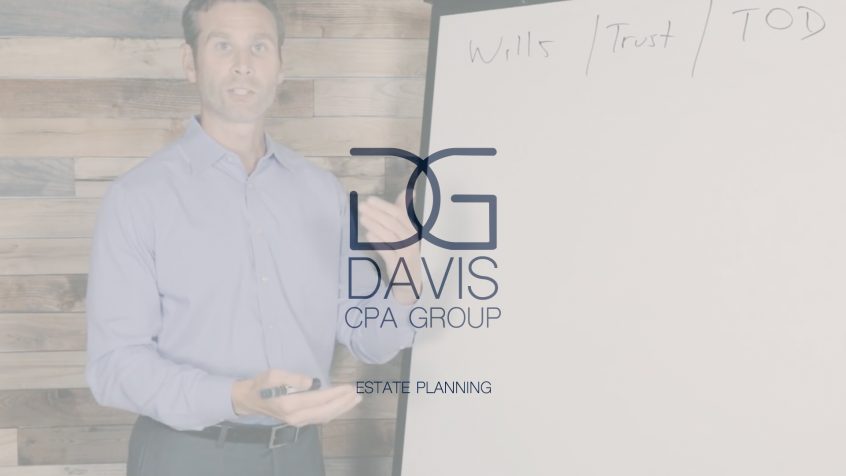Brandon Davis of Davis CPA Group in Joplin, MO, discusses estate planning in terms of vehicles for estate planning and tax implications.
Hi Brandon Davis again with Davis CPA Group. Today I want to talk about estate planning. A lot of times when I’m working with my clients, particularly ones that have businesses for a long period of time, amassed a little bit of wealth, I get a lot of questions about what they should do with that. Should they get a trust, should they get a will? And so we’re going to talk about that a little bit today. What we’re going to talk about is going to border on a little bit of legal advice and things that we probably need to talk with our attorney friends just to make sure we’re on point but I’m just going to kind of give you an overview of different types of vehicles for estate planning but also talk a little bit of the tax implications of some of those things.
One of the things I get asked a lot of times is “Should I create a trust and if I do create a trust how does it work, does it pay its own tax, what do I put in it?” and so forth. A couple of things that I’ll talk about, maybe three ways to start the estate planning process and avoid things like probate and some of that is what we’ll jump into here. So whenever someone passes away, at the time of their passing, whatever assets they own, whether its bank accounts, investment accounts, a house, a car, and what have you, they basically become part of that person’s estate. And so what happens is we’ve got to figure out where do these assets go, who do they transfer to, who are the next of kin that will become the heirs of this property and how do I, as a person, while I’m living, control some of that.
You hear a lot about wills. We’ll talk about that. You’ve got trusts and also you’ve got a TOD designations, transfer on death designations, is what that stands for or maybe beneficiary, death benefits and things of that nature and other terminologies. Wills basically are a document, it’s a legal document, and so it puts together and documents their wishes upon their passing. Now a will does not necessarily avoid probate and we’ll talk about probate in a minute. A will, at the very least, lets those who are charged with handling that person’s affairs after they pass, either a family member or their spouse, a child or even someone whose appointed by the court system to handle that person’s affairs and close out their estate, the will, at least leaves a list of wishes that the person has. You know, “I want $10,000 in my bank account to go to my nephew, Jimmy. I want my house to be sold and all of the proceeds donated to a church or my favorite charity.” They basically dictate that and the person that’s assigned to be in charge of that, who’s usually called the executor of the estate, is generally supposed to follow that will through getting permission from the court and what have you.
A trust is a little bit stronger, in that it’s a little bit different of an animal. A trust actually becomes its own entity. While someone’s alive, they have what’s called a living trust or trust that’s disregarded for tax purposes. It’s basically a legal structure that people have to title their assets in. And what I mean by title, one of the terms that attorneys use is a funded trust.So a lot of times I may have someone come in and say, I ask them, “You have a trust?”
“Oh yeah, I got a trust.”
“Okay, that sounds great. Are your assets titled in that trust?” And they kind of look at it funny.” What do you mean? I got a trust, ain’t that good enough?” The answer is no, its not.
Once someone creates a trust, which is a separate legal entity, they have to take additional steps and usually their attorney helps them through this process to fund the trust. And how you fund the trust is actually transfer legal title to all of your assets that you want inside this trust, to the trust name. A lot of time, say for example, I want to create a trust, I may call it the Davis Family Living Trust, and so we got this trust we’re gonna create, we’ll call it the David Family Trust.
And while I’m alive, and one thing I gotta step back and say here, I’m talking about revocable trusts, meaning they can be changed. We’re gonna talk about irrevocable in a minute and what that means, but right now we’re gonna focus on a revocable trust, which I’m sure some of you may have heard that term before, and not sure what it means. But basically it means a trust that I can change, at any time; I am the creator or grantor of this trust, and I’m also the trustee while I’m living. A lot of times, if I’m married, my spouse may be a successor or co-trustee and we’ll talk a little bit more about that later too. But I just wanna kinda touch at a high level right now.
So I’ve the Davis Family Trust, and once that’s set up, in order to fund that properly, say I’ve got a house. Well I’ve got to retitle my house with a deed into the trust, so I gotta move my house into here, maybe I have bank accounts, well I’ve got to put the bank accounts in the trust name and [inaudible 00:04:45], so I’ll move that under here, there may be some retirement accounts that I have, or maybe not, there may be some tax implications why we don’t want to put retirement accounts in a trust, and we can talk about that at a later date. But any assets, if I certainly had this is a regular investment account, I may want that in the trust. Now the nice thing about this is it does offer some layer or level of liability protection meaning another legal entity technically owns these assets, I don’t own them, I control them, because I’m the trustee of the trust, and it’s changeable cos it’s revocable, so I can spend all this money; I can sell my house; I can liquid all my investments; I can do whatever I want; I can buy a boat with all of it, and blow the rest on trips to Hawaii or whatever. I can do whatever I want.
What’s interesting though is, once I pass away, however I’ve documented my trust and set up, nothing can be changed, and then the beneficiaries basically are named, and my wishes within the trust document are adhered to. And who administers that is the trustee that I have named to take over once I pass away.
So a trust is a little bit more of a firm document to establish your wishes but also hold assets for distribution upon your passing.
Another thing that a trust can do for ya is give you some layer of flexibility in estate planning purposes. That’s where we could talk about irrevocable trusts, meaning trusts that I can’t change. If I set up an irrevocable trust and I move assets into that trust, I’ve effectively lost control of those assets, so there could be some estate planning ideas and some different things you might want to look at relative to that. But that’s kind of the simplest form what a trust will do for yeah.
In going a little bit further, talking about transfer on death, sometimes we talk about different things we can do relative to estate planning and we make things way more complicated than they need to be. A lot of time, simple designations like transfers on death or beneficiary deeds on a house, can accomplish everything we wanna accomplish, without having to go through these different steps as far as additional expense or additional sophistication in getting a trust done. So if I’ve got a situation where it’s a simple husband and wife, maybe they’ve got a couple of kids, they’ve got a retirement account in their name, they’ve got a house; they’ve got some vehicles, and a little bit of savings, right. Simple. Typical run of the mill, American family situation. Well they can avoid probate, I’m gonna touch on probate a little bit, what probate is, probate’s a legal process. If I were to pass away and not have a trust in place, or had a will or just had assets, when I pass way, those assets basically get allocated or dealt with through a probate system, where you basically go to court, you have an executor, usually an attorney involved and when you go through that process, there is some cost.
Well, it’s not as scary and bad as it sounds sometimes, particularly when people are taking “Oh gosh, I wanna avoid Probate.” Well all you do is have extra time and cost and a little bit more steps to go through to get the heirs those assets. Now one of the things I’ll say here is to avoid that, you can do transfer on death designations, a lot of these types of things. And so if you have retirement accounts, you certainly wanna talk to the custodians of those accounts and say “Hey I wanna leave 25% to my nephew and 50% to my kid, or 50/50 to my two kids, whatever, and it’s called transfer on death designation or beneficiary designation. So you wanna put those on your retirement accounts.
The house, you can do something very similar whit the house, you actually file what’s called a beneficiaries deed with the county that you reside in, and when you file that deed, it doesn’t transfer the ownership, it basically says, at the time of my passing, my house is gonna go to whoever I’ve listed on that beneficiaries deed. So you can do a beneficiaries deed.
The other thing, a vehicle. Again you can put a TOD on title, which is a transfer of death designation of the title, and savings accounts and other bank accounts, you can generally do the same thing, do a TOD on those also.
So by doing all of this, you’ve basically went ahead in advance of passing away which is kinda morbid to talk about I know, but you’ve went ahead and planned out how you’re gonna allocate everything and where it goes, and really it won’t leave much left for your estate to deal with and could avoid probate.
So those are the three things I just wanna talk about briefly as it relates to estate planning. My next video, I’m gonna dive a little bit deeper into trusts, talk a little more about revocable trusts, irrevocable trusts and taxation.


